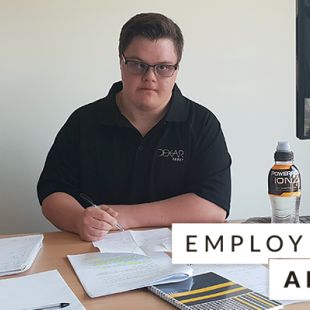Interviewing people with disability
When interviewing people with disabilities, it is important to keep a few things in mind. These will help ensure a fair process for all. Think about what to adjust, what to ask in the interview and how you assess job applicants.
Before the interview
It’s important to give all candidates a clear outline of what to expect in the recruitment process. This helps people decide if they will need support at any stage. By law, you must make any changes needed to help a candidate with disability take part in the interview. These are called ‘reasonable adjustments’.
If an applicant discloses their disability, contact them. Ask if they need adjustments for the interview. If the answer is:
- no, this means you can’t ask any more questions about their disability.
- yes, you can ask about the type of adjustment they need, but not about the disability or condition.
If you work with a Inclusive Employment Australia provider, they will tell you if you need to make any special arrangements.
Before the interview, tell your receptionist and the interviewers about any specific needs, if needed. You must have consent from the candidate to share information about their disability. See Protecting the privacy of staff with disability for more information.
Examples of adjustments for an interview
Examples of adjustments and support might be:
- giving a person with vision impairment more detailed instructions and extra time to find your building.
- organising an Auslan interpreter for an interview with a person who is deaf.
- making sure the interview venue has clear access for a person who uses a wheelchair.
For more on types of changes and what you must do, see Guidelines on reasonable adjustments.
Interview questions
Under the Disability Discrimination Act, it is illegal for employers to ask for details about a candidate’s disability. You can only ask questions about how their disability might affect how they do the job and work safely.
You can ask about:
- changes to the workplace that will support them to do the job.
- changes to work hours or rosters to help them do better in the role.
- keeping the workplace safe for them and everyone else.
You can’t ask personal questions about the lifestyle of a person with disability. You can’t ask general questions about their health or disability, like how they got it.
Basically, ask the same questions that you would of a person without disability.
Types of questions you can ask
- Will you need any special work arrangements so you can do your job?
- Will you need us to make any changes here in the workplace?
- Do you have ideas about good ways to do your job?
- Do you have ideas for making your workplace safe?
- Do you take any medication that might make it unsafe for you to do any of the job’s tasks?
- How will you let us know about medical appointments so we can change your work roster?
Types of questions you can’t ask
- Do you take a lot of medication?
- Are you sick a lot?
- How many times a year do you go to the doctor?
- Are you going to be able to cope?
- Does your disability make you get angry with other people?
- Have you ever lost a job because of your disability?
Other assessments
Make sure any assessments in the recruitment process are in accessible formats. For example, if there is a written test, provide an option to give spoken responses if an applicant has trouble with fine hand coordination. All assessments must relate only to the basic requirements of the job.
Any medical checks must relate to the job. Medicals should only test whether the applicant’s fitness or health allows them to meet the job requirements.
Financial support for adjustments
Your organisation may be eligible for financial assistance through the Employment Assistance Fund (EAF). The EAF can help cover any costs for changes and services to support people with disability in the workplace, this can include using an Auslan interpreter at an interview.
To find out more, visit our Funding for changes in the workplace page or contact a JobAccess Adviser.
Useful Downloads
Related pages
Last updated:
Preparing for success with disability employment interviews
Once you’ve had a person with disability apply for a job, what comes next? Just like with anyone else, it’s time for an interview.

Recruiting people with disability - Interview and selection process
Topics covered in this video:
what employers must do in the interview process, how to assess candidates, asking about adjustments, how and when to ask about disability.
